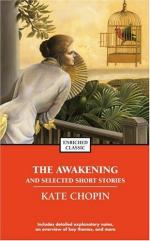|
This section contains 16,370 words (approx. 55 pages at 300 words per page) |

|
SOURCE: Gunning, Sandra. “Rethinking White Female Silences: Kate Chopin's Local Color Fiction and the Politics of White Supremacy.” In Race, Rape, and Lynching: The Red Record of American Literature, 1890-1912, pp. 108-35. Oxford: Oxford University Press, 1996.
In the following essay, Gunning analyzes Chopin's works for evidence of her views on racial violence and stereotypes.
Harris & Page of course wrote from a different standpoint;—that of the white gentleman as I write from the standpoint of a white lady.
—Grace King
In any discussion of late-nineteenth-century American and African American literary discourses on white supremacist violence, George Washington Cable, Thomas Dixon, Thomas Nelson Page, Ida B. Wells, Charles Chesnutt, Sutton E. Griggs, David Bryant Fulton, and even Pauline Hopkins must undoubtedly be included as prominent figures. Yet this standard list suggests that lynching and mob rule were of concern only to black and white male writers and to black...
|
This section contains 16,370 words (approx. 55 pages at 300 words per page) |

|


